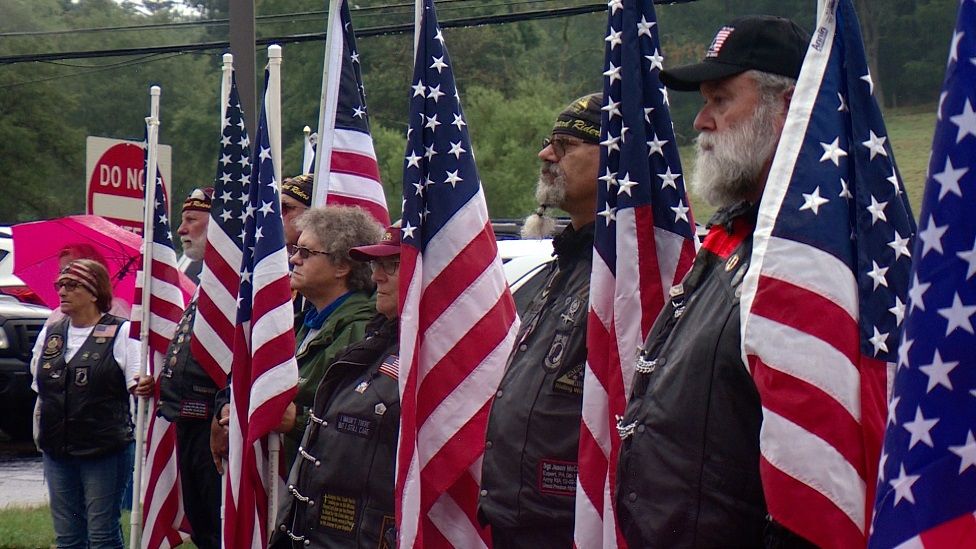Afghanistan crisis: How America watched as Taliban won the war
- Published

US President Joe Biden admitted the Taliban's lightning-fast return to power would be "gut-wrenching" to the many Americans with a profound connection to Afghanistan. We spent the day with military veterans who served - and lost loved ones - in the conflict, and with Afghans who now call the US home.
Despite the driving rain, dozens of people congregated outside the post office in Hookstown, Pennsylvania, as it was renamed after Staff Sergeant Dylan Elchin, a son of the town killed by a roadside bomb in Afghanistan.
"It's very wonderful to see Dylan honoured," said Sgt Elchin's grandfather Ron Bogolea.
"He sacrificed everything for our country and I believe that we should all be honouring our military more - for what they do for not only the USA but for the entire world," he said.
Though the process to pay this tribute to Sgt Elchin started soon after the 25-year-old died in 2018, the renaming event ultimately happened as the US scrambles to leave Afghanistan and with the Taliban now in charge. That was not lost on the speakers at the Hookstown ceremony.
"The events of the last several days have shown that we don't always succeed, we certainly are not perfect, but our hearts are in the right place," said US Congressman for this area, Conor Lamb, during his speech here.
But Christian Easley, an Air Force recruiter who helped train Sgt Elchin, told me that for him the current circumstances in Afghanistan had not changed his perspective at all.
"Dylan had to follow his orders to go accomplish his mission. He did everything that was asked of him and then some," Mr Easley said.
"Regardless of what has happened during this past week I knew that Dylan did everything right."
For some though, this has clearly been a time for profound reflection.
Captain Jeremy Caskey, the Chaplain that offered the invocation at the ceremony here, had himself served in Afghanistan. His brother, Marine Sgt Joseph Caskey, was killed in action there in 2010.
When asked about the turn of events in Afghanistan this week, he took a moment to collect his thoughts.
"It has been very difficult. You always want to know that what you are doing has purpose and meaning, but purpose and meaning doesn't just come in victory. I believe sometimes it comes in the sacrifice and the experience of it," says Capt Caskey.
"Are we better off? Is the country better off? Are they better off? It's hard to say."
Just miles from the White House, Fawzia Etemadi and her cousin, Hamid Naweed, watched President Biden's address in numb silence.
"We trusted Joe Biden, but we are a little disappointed - the world is disappointed," Fawzia said. She had hopes that Mr Biden would uphold his promise to bring peace to her country.
"Afghans have suffered for the last 40 years. America is the world's father, democracy's father. No-one can explain why this is happening."
Like thousands of Afghans living in northern Virginia, Fawzia and Hamid both fled Afghanistan as refugees in the 1980s and ultimately settled a few miles away from the nation's capital. The area is home to one of the largest Afghan diasporas in the country.
As we sip tea at Afghan Bistro, the family's restaurant, Fawzia and Hamid admit they've spent much of the last week in stunned disbelief.
"We couldn't go to sleep, we were worried about our loved ones back home," said Hamid, a former professor at the University of Kabul. Seeing so many people trying to flee their homeland, "running away from their hopes", was also difficult.
"I don't know how the Taliban came in power so fast," Hamid continued, "but I hope that the world will recognise that people of Afghanistan need their freedom and independence and we deserve to live in peace."
Protesters have gathered outside of the White House in support of those in Afghanistan.
Additional reporting by Xinyan Yu.